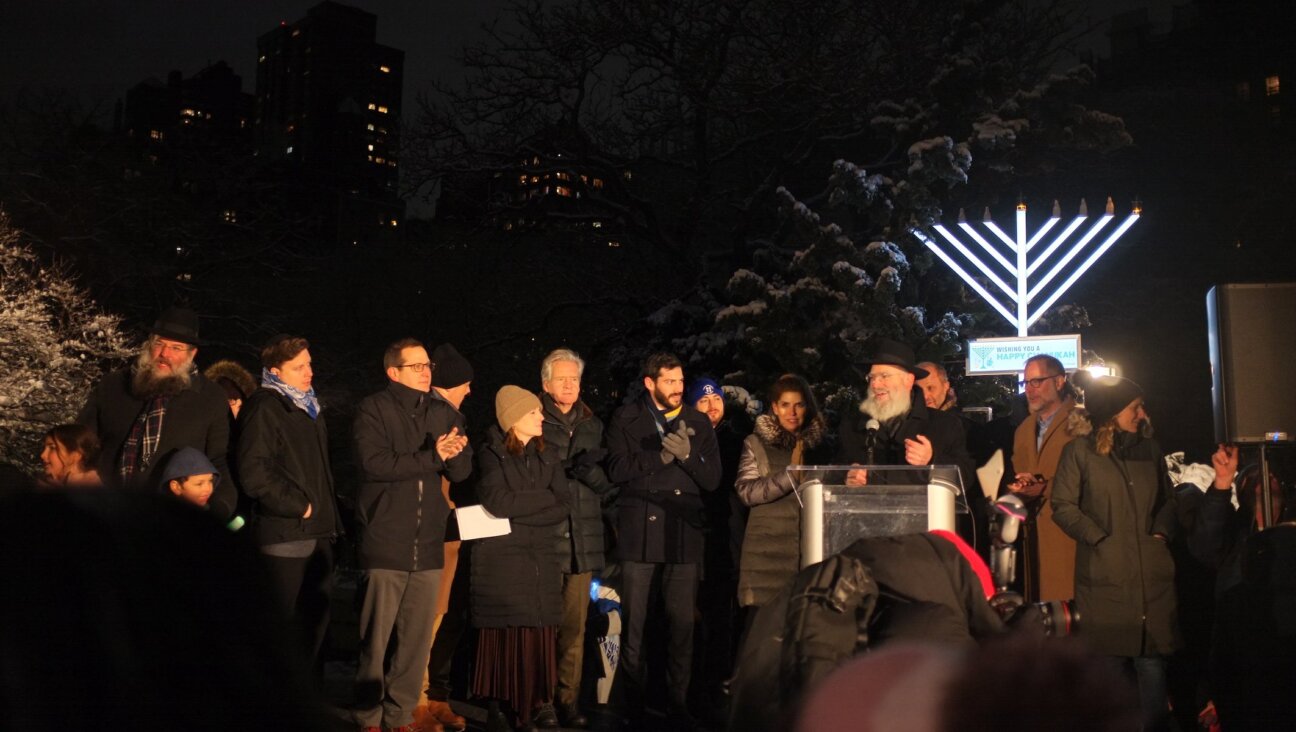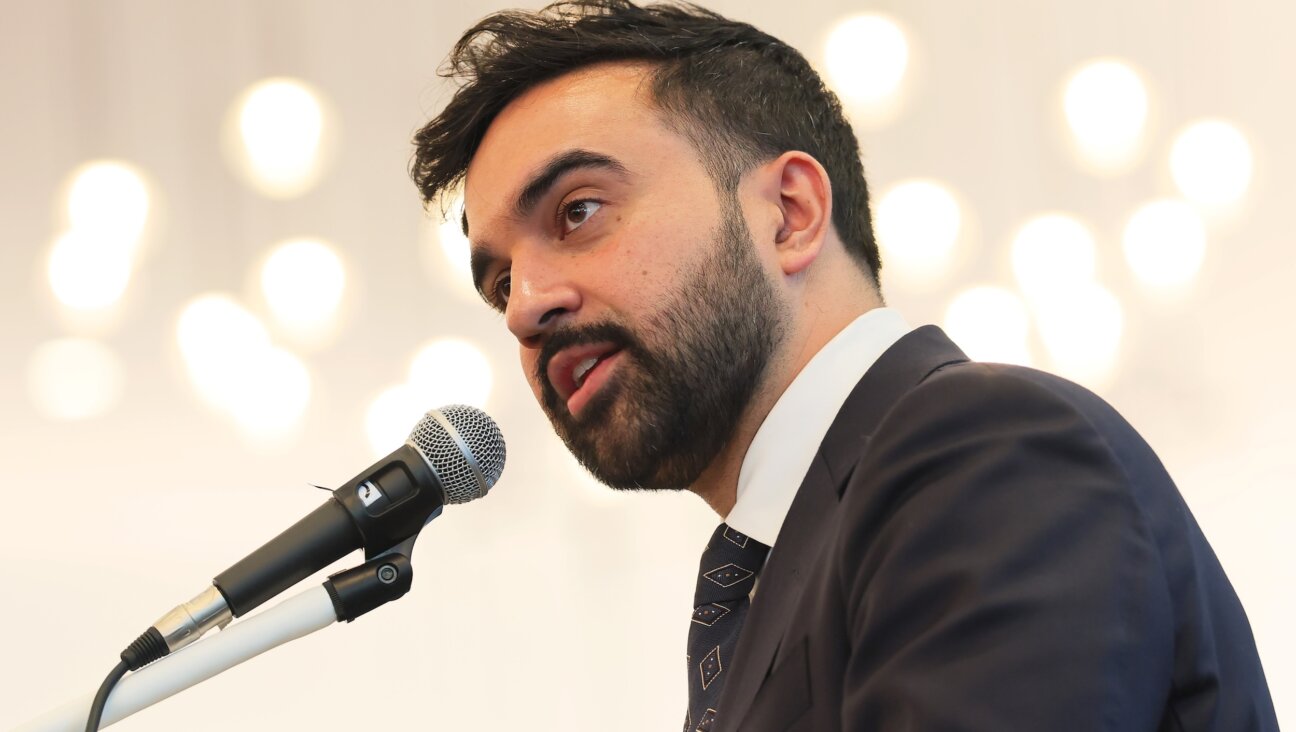Barack Obama’s Visit to Israel Fails To Ignite Faded Peace Hopes — On Either Side

Graphic by Angelie Zaslavsky

An Eternity Ago: Then-candidate Barack Obama meets with Israeli Pinhas Amar to see damage from Palestinian rockets in his home in Sderot. Amar was impressed with Obama, but has become disillusioned in the four years since. Image by getty images
Five years ago, a few months after a Palestinian rocket crashed through his kitchen ceiling, Pinhas Amar received a more welcome guest at his southern Israeli home – Barack Obama, then running for president of the United States.
Amar holds up a picture he now keeps in a back room – unframed and glued to thin cardboard with crumpled corners – of himself showing the missile damage to Obama. He was impressed by the candidate, he says. The president Obama became: less so.
“He promised me he would make sure there would be no more rockets,” said 53-year-old Amar, whose wife was injured in the December 2007 missile attack. “It is quieter today, but I am not optimistic. This calm will not last very long.”
If there is one thing that seems to unite Israelis and Palestinians days before Obama’s visit to Israel, the occupied West Bank and Jordan next week, it is their talk of broken promises and lack of hope that he will ever bring peace.
Across the frontier, in Gaza, Badiaa Anbar, 53, was demonstrating with other parents for the release of Palestinian prisoners in Israeli jails. Her own son, she said, was imprisoned 18 years ago for being affiliated with militants.
Despite initial pledges to work hard for a Palestinian state, Obama has turned out to be no different than any of his predecessors, she said.
“Obama’s promises were as deceiving as a mirage. None of these promises came true.”
ONLY WORDS
In his first term Obama started off by making peace between Israelis and Palestinians a top priority. His 2009 “new beginning” speech in Cairo raised Palestinian hopes of establishing a state in the West Bank, East Jerusalem and Gaza, territories Israel captured in a 1967 Middle East war.
But those hopes plunged when U.S.-brokered peace talks collapsed in 2010, only weeks after they began. Israel ignored Obama’s call to halt the construction of Jewish settlements in the West Bank; the Palestinians refuse to talk as long as settlements are being built.
This time around Obama’s administration is wary of risking its credibility on efforts to revive talks. The White House has said there would be no launch of a diplomatic initiative during the trip.
In the market of Gaza’s Beach refugee camp, Baha al-Haddad, 45, a public servant, predicted nothing would come of Obama’s visit. “He will make another speech and make promises but it will only be words without fulfilment,” he said.
In November last year, days after Obama’s election to a second term, Israel and Hamas, the Islamist movement that rules the Gaza Strip, fought an eight-day war in which some 170 Palestinians and six Israelis were killed.
Gaza was pummelled by air, land and sea while rockets exploded in Israeli towns, including Sderot, just across the border from the enclave.
The United States funds Israel’s missile interceptor system, Iron Dome, which blew up many of the incoming rockets. Nevertheless, some Sderot residents do not believe Obama has their best interests at heart.
“It would be disastrous without Iron Dome,” said Yaffa Malka, 49, a hairdresser who has lived in Sderot her entire life. “But all he (Obama) cares about is talking about a Palestinian state and not how to stop Hamas arming itself.”
WEST BANK
In the occupied West Bank, mistrust of Obama is one of the only things Palestinians and Israeli settlers share.
“I don’t think Obama’s a player. I don’t think he’s proved to be effective on either side really, not on the Arab side and not on the Jewish side and no one really cares what he has to say,” said Aliza Herbst, 60, a yoga teacher and former settler spokeswoman.
In the past year, the White House has voiced condemnation of Israeli settlement expansion in the West Bank, which U.S. presidents have described for decades as an obstacle to peace.
“I didn’t know how bad he would be for Israel,” Herbst said, sitting in her sunny garden in Ofra settlement, where she has been living for the past 31 years. “He’s probably one of the most anti-Israel presidents, certainly in my lifetime and maybe in the history of the United States.”
The Obama administration rejects the suggestion that he is less supportive of Israel than previous U.S. presidents, and points to strong cooperation with Israel on security matters.
Meanwhile, despite failing to win over many Israelis, Obama also lost support among Palestinians last year when he opposed a successful Palestinian bid for recognition as a de facto state by the U.N. Generally Assembly.
In the West Bank town of Tubas, Loai Dawwas, a 41-year-old pharmacist, said Obama’s rejection of the U.N. recognition bid quashed Palestinian faith in him.
“He is a man of speeches like the speech he had gave in Cairo, but what did he implement of those promises? Nothing. And he will not do anything useful for us. America is good for Israel only,” Dawwas said.
Mohammad Zaid, a grocer in the Palestinian city of Ramallah, also predicted Obama’s visit would lead nowhere, even as change is sweeping through other countries in the region.
“The Arab world is a mess. Look at Libya, Syria, Egypt. Palestine is an easier issue than all that. But we don’t think Obama is going to change anything,” Zaid said.
















